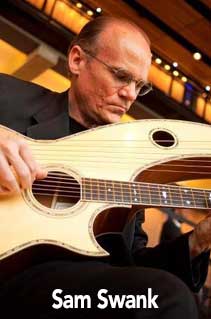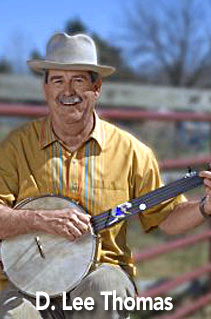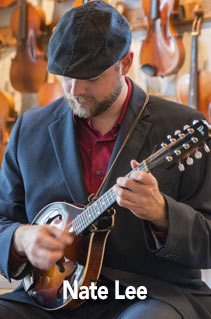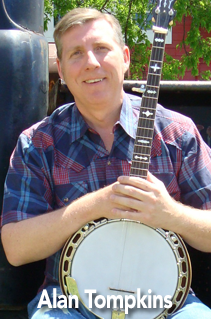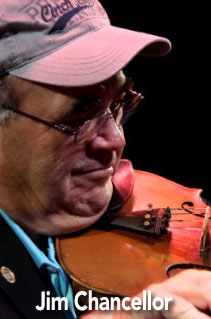Irl Hees – Bass
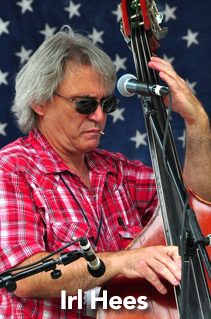 On December 11th, 1976, at 16 years of age, Irl Hees began playing the upright bass. It was a very important day in his life. Up to that day, he had been playing a washtub bass; one quarter-inch strand of nylon clothesline cord on a number 3 galvanized washtub. After that day, he never looked back.
On December 11th, 1976, at 16 years of age, Irl Hees began playing the upright bass. It was a very important day in his life. Up to that day, he had been playing a washtub bass; one quarter-inch strand of nylon clothesline cord on a number 3 galvanized washtub. After that day, he never looked back.
He began working with Oklahoma banjo player Kenny Cantrell the following year, and took several more regional band gigs over the next 10 years. Irl was the original bassist in the Midwest group “Radio Flyer”, and in the late 80’s, Irl began a group called “Down The Road”. The band lasted about 6 years. It was during this time that he joined with several others to produce and record “The Missouri Session”, a CD devoted to showcasing several Midwest bluegrass bands and musicians in a studio setting.
Irl began playing professionally in 1995 when he joined Rhonda Vincent’s country band. In 1996, he was part of the original RAJ’E band, which later became Rhonda Vincent and the Rage. Irl then joined Chris Jones and the Night Drivers, and eventually did two stints with Chris, appearing on Chris’s “Just A Town” album. In 2002, Irl joined the Lonesome River Band, and recorded “Window Of Time” with LRB.
The Grand Ole Opry, The Jerry Lewis Telethon, Music City Roots, Larry’s Country Diner, are just a few of the venues Irl has appeared on over the years. He has performed with actress Mare Winningham and her ‘Jewgrass Boys’ several times, and he knows Miles Cleverly of the Cleverly Trio personally, although he’s never seen Miles perform. That’s OK, because Miles has never seen Irl perform, either. Irl has also worked with Roy Rogers Jr. as a Highrider for two years.
Irl now enjoys teaming with bandleader Clay Hess in the Clay Hess Band, and does occasional session work for other bluegrass performers. He still has the old wash tub as a reminder of where he came from, but prefers the acoustic upright bass, although he has toyed with donating the wash tub to the IFWS…..the International Foot Washers Society.
Clay Hess – Guitar / Mandolin
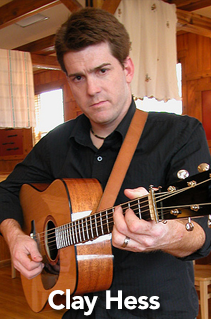 Clay Hess is a Grammy award winner who first burst upon the national bluegrass music scene as the red-hot flat-picking guitarist with Ricky Skaggs & Kentucky Thunder, with whom he toured for three years. With his awesome speed and tasty sense of syncopation, Hess has established himself as one of the top flat-pickers in the business.
Clay Hess is a Grammy award winner who first burst upon the national bluegrass music scene as the red-hot flat-picking guitarist with Ricky Skaggs & Kentucky Thunder, with whom he toured for three years. With his awesome speed and tasty sense of syncopation, Hess has established himself as one of the top flat-pickers in the business.
Clay began playing guitar at age nine after hearing Tony Rice’s landmark recording, “Manzanita.” From there, Clay’s life was changed because all he did was play his old cheap “guitar. Before too long, Clay got his first “real” guitar when his dad bought him a new Martin D18 for his birthday. Clay continued to hone his skills and develop his own style, winning guitar contests along the way, including the Ohio State Guitar Championship in 1995. When he was 19, a friend told him about an open audition at Dollywood. Clay landed the gig, playing guitar with the band, True Blue. Fellow musicians were noticing Clay’s talents as a country and bluegrass guitarist. One of them was multi-Grammy Award winning country/bluegrass artist Ricky Skaggs.
httpvh://youtu.be/KVPovaypgEY Eventually Clay left Dollywood to return home to Ohio. He was working in construction and had nearly quit playing altogether when Ricky Skaggs called in 1999 and asked him to fill the guitar slot for Kentucky Thunder. Clay thought the call was a joke and hung up the phone. Ricky called a second time and convinced Clay that the offer was real. Clay was thrilled at the opportunity to play rhythm and lead guitar with these stellar musicians. Clay spent the next three years performing with Kentucky Thunder. While Clay was part of the band, the International Bluegrass Music Association awarded Kentucky Thunder their Instrumental Band of the Year Award for both 1999 and 2000. Clay recorded on three projects with Skaggs, and was awarded a Grammy for his participation on the project “Soldier of the Cross.”
After leaving Skaggs’ band, Clay toured with The Mark Newton Band playing mandolin and then guitar before joining Mountain Heart. Shortly, he left to join one of the hottest young bands around, Sierra Hull and Highway 111, before starting The Clay Hess Band.
Though Clay largely considers himself a bluegrass player, his influences range outside of bluegrass and include players such as Stevie Ray Vaughan, Charlie Parker and Leon Rhodes. My Favorite Guitars in conjunction with the custom shop at the CF Martin & Co. created two limited-run Clay Hess Signature models in 2005 and 2009.
For more info about Clay visit ClayHess.com
Ned Luberecki – Banjo
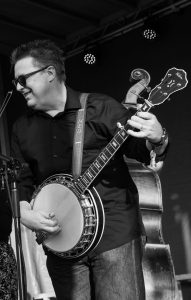 Ned is the 2018 IBMA Banjo Player Of The Year and an all-around bluegrass legend. Ned is an incredible banjo picker and music educator. Ned is funny. He was a member of Paul Adkins & The Borderline Band, The Rarely Herd and, most recently, Chris Jones & The Night Drivers for over a decade.
Ned is the 2018 IBMA Banjo Player Of The Year and an all-around bluegrass legend. Ned is an incredible banjo picker and music educator. Ned is funny. He was a member of Paul Adkins & The Borderline Band, The Rarely Herd and, most recently, Chris Jones & The Night Drivers for over a decade.
The Baltimore, MD, native, who now makes his home in Nashville, TN, is a partner in the Nedski & Mojo duo and a favored guest on stage and in studio with artists ranging from Jim Lauderdaleto Tony Trischka to Ray Stevens to Sam Bush. Since the early 1980s, Ned has maintained a busy schedule of private lessons, along with workshops and camps in the U.S., Canada, U.K. and Europe. He is the author of Alfred Publications three-part Complete 5-String Banjo Method and has pioneered on-air instruction with his popular “More Banjo Sunday” and “The Sunday Banjo Lesson” on SiriusXM’s Bluegrass Junction, where he also hosts the regular newgrass show, “Derailed,” keeping us laughing all the way down the road. For several years now, Ned has also been the voice of the IBMA awards show. He and his Bluegrass Junction compadres were honored with a 2016 IBMA Distinguished Achievement award. Check out his critically-acclaimed latest album, Take Five, when you have a moment, as well as his new series of instructional videos for TrueFire.com. Visit Ned online at Nedski.com.
httpvh://youtu.be/LAkQc0Im7uI
Maurice “Reece” Anderson – Dobro
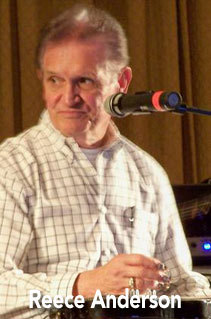 Early in his career Reece gained national prominence playing with Bob Wills then distinguished himself with remarkable talent and facility in many musical genres. He recorded and performed internationally with major artists on radio, television and motion pictures. Co-founder and president of MSA steel guitars, he is a legendary player known worldwide as a teacher, innovator, writer, recording artist, and is referenced as the “Master Of Chords.”
Early in his career Reece gained national prominence playing with Bob Wills then distinguished himself with remarkable talent and facility in many musical genres. He recorded and performed internationally with major artists on radio, television and motion pictures. Co-founder and president of MSA steel guitars, he is a legendary player known worldwide as a teacher, innovator, writer, recording artist, and is referenced as the “Master Of Chords.”
Sam Swank – Fingerstyle Guitar
Sam Swank is a life-long Dallasite who started playing guitar in 1968 when his father brought home a copy of “Are You Experienced” by Jimi Hendrix to supplement his record collection, which consisted of “The Monkees Greatest Hits” and “Revolver” by the Beatles.
Sam has made his living as a professional musician and guitar instructor for 25 years. He studied classical guitar with Rick Madriguera at Eastfield College and Tom Johnson at the University of North Texas. He has recorded and performed with such diverse talents as Johnny Reno, Olivia Newton-John, Ray Wylie Hubbard and Andy Timmons. (Sam believes Andy is really coming along!)
Sam’s approach to teaching is always tailored to individual needs. He specializes in acoustic fingerstyle and classical, as well as rock and blues styles. He enjoys corrupting strict classical and acoustic players with rock and blues music, and vice-versa. He even plays bluegrass well enough to fool undiscriminating listeners, but tries not to tell too many people. Sam really likes helping people improve their guitar skills.
Acoustic Music Camp Instructors
Greg Cahill – Banjo
Chicago born and bred, Greg Cahill has been playing bluegrass banjo since the early 1970s. He co-founded The Special Consensus in Chicago in 1975 and has continued to tour nationally and internationally with the band ever since. In 1984, he created the Traditional American Music (TAM) Program to introduce students of all ages to bluegrass music. He has appeared on all 20 of The Special Consensus recordings, on numerous recordings by other artists and on many national television and radio commercial jingles. Greg has also released three recordings: Lone Star (1980, with guests Jethro Burns and Byron Berline); Blue Skies (1992, with Chicago mandolinist Don Stiernberg); and Night Skies (1998, with Don Stiernberg and guests Sam Bush, Glen Duncan and Tom Boyd). He has also recorded and toured European countries with the ChowDogs (Greg and Slavek Hanzlik, Dallas Wayne and Ollie O’Shea). Greg has released four banjo instructional DVDs and three banjo tablature books and he teaches banjo at festival workshops and music camps nationally and internationally. He is a banjo instructor at the Old Town School of Folk Music in Chicago and has been an adjunct faculty member of the music department (teaching banjo) at Columbia College in Chicago. He served on the Nashville-based International Bluegrass Music Association (IBMA) Board of Directors from 1998-2010 (Board Chair/President 2006-2010), became a Kentucky Colonel in 2010 and was awarded the prestigious IBMA Distinguished Achievement Award in 2011. Greg was also appointed to the Board of Directors of the Nashville-based Foundation for Bluegrass Music in 2007, elected President of the organization in 2011 and rotated off that board in 2012. The 2012 Compass Records band recording Scratch Gravel Road was GRAMMY-nominated for Best Bluegrass Album; the 2014 Compass Records band release Country Boy: A Bluegrass Tribute To John Denver received two IBMA awards; the 2016 Compass Records band recording Long I Ride received an IBMA award and the 2018 Compass Records recording Rivers And Roads received two IBMA awards (one for Album of the Year) and a GRAMMY nomination for Best Bluegrass Album. Greg served on the Recording Academy Chicago Chapter Board of Directors 2018-2020 and he was inducted into the Society for the Preservation of Bluegrass Music in America (SPBGMA) Hall of Greats in Nashville, TN in 2020. Greg appears on the 2020 Special C Compass Records release Chicago Barn Dance, the 20th band recording that received the 2020 IBMA Song of the Year Award.
Dan Eubanks – Bass
Dan Eubanks grew up in Crystal City and St. Louis, Missouri, and his grandparents began taking him to bluegrass festivals at a very young age in the 1970s. He began playing music on drums, then banjo and guitar, and eventually electric bass at age 12. Dan played in country and rock bands throughout high school and attended college on a music scholarship. His study of jazz bass playing eventually led him to the upright bass and a very diverse musical education that included study of nearly all styles of American music and procurement of a Master’s degree in Jazz Studies from Webster University in St. Louis. In 2003, after many years of teaching at several St. Louis-area colleges and universities as an adjunct professor, Dan’s desire to get back to his bluegrass and country roots prompted his move to Nashville. He has been teaching, performing with various bands and working as a studio session musician since his relocation, and he has appeared on the television show “Nashville” several times as a side musician in bands that support main characters. Dan joined Special Consensus in 2013 and made his first band recording appearance on the 2014 Compass Records band recording Country Boy: A Bluegrass Tribute To John Denver that received two International Bluegrass Music Association (IBMA) awards. He also appeared on the 2016 Compass Records band recording Long I Ride, which also received an IBMA award, and on the 2018 Compass Records band recording Rivers And Roads that received two IBMA awards (one for Album of the Year) and a GRAMMY nomination for Best Bluegrass Album. Dan released a solo recording titled Look What The City’s Done in March 2019 and he appears on the 2020 Special C Compass Records release Chicago Barn Dance,which received the 2020 IBMA Song of the Year Award.
Greg Blake – Guitar
Greg Blake was born and raised in the hills of West Virginia but he has spent most of his life living and working in Kansas City – on both sides of the state line. After graduating from high school in West Virginia, Greg attended bible college in Overland Park, Kansas where he met his wife. They both pursued further education, careers, and raised a family for 25 years in Kansas before moving to Colorado in 2007. While in Kansas, he was a member of the Bluegrass Missourians for nearly 15 years. During that time, the band received multiple awards from the Society for the Preservation of Bluegrass Music in America (SPBGMA), and he received two nominations for SPBGMA’s Traditional Male Vocalist of the Year and nine nominations for SPBGMA Guitarist of the Year. By the time Greg moved back to Kansas City, KS in 2017, he had received five consecutive SPBGMA Guitarist of the Year awards, a Kansas State Flatpicking championship and a nomination for the International Bluegrass Music Association (IBMA) Male Vocalist of the Year Award. A highlight in 2015 was a debut solo album that was named by several sources among the Top Ten albums of the year. Greg has also toured with the Greg Blake Band and, most recently, with Jeff Scroggins and Colorado. In March, 2021 Greg officially became the Special Consensus guitar player and also released a solo recording titled People, Places and Songs on the Nashville-based Turnberry Records label.
Michael Prewitt -Mandolin
Michael Prewitt was born and raised in the foothills of the Cumberland Mountains in rural Whitley County, Kentucky, outside of the town of Williamsburg. It was there he learned to play bluegrass music, first on the fiddle and then on what would quickly become his life’s musical love, the mandolin. Throughout middle school and high school he played in his school district’s after-school bluegrass band, Colonel Strings, and after graduating he played with the Eastern Kentucky bluegrass band Mountain Drive. Michael then took a haitus from playing music to attend college at the University of the Cumberlands. He moved to North Dakota after graduating to begin graduate school and, while there, he began playing mandolin and banjo with the North Dakota-based Flatt Mountain Bluegrass Boys. After a few years of teaching English at the University of North Dakota, he decided to focus his attention on his musical career and he relocated to Minneapolis, Minnesota where he co-founded the neo-traditional bluegrass band Back Up & Push. The band released a well-received album with Michael playing guitar, singing lead vocals and contributing multiple original compositions. He joined Special C in September of 2021 and made his onstage debut with the band later that month playing mandolin and singing lead and harmony vocals.
Ross Nickerson – Banjo
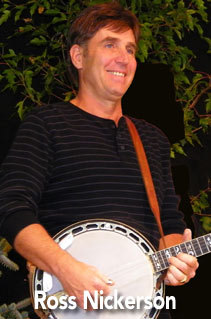 Ross Nickerson has recorded with some of the top names in bluegrass music. He was recently included on a compilation CD called Ultimate Banjo that included banjo legends Earl Scruggs and Sonny Osborne. Ross recently appeared on stage with The Riders in the Sky and The Oak Ridge Boys and has picked and appeared with many of the best banjo players in the world, including Earl Scruggs, Bela Fleck and Ralph Stanley. Ross’s CD Blazing the West has won many awards, including being named by Country Music Television as one of the top ten CDs to pick up in 2003. Ross has just completed a new CD called Let’s Kick It that features hard driving traditional bluegrass banjo with Ross’s own personal touch. Accompanying Ross on the CD are members of the world renowned bluegrass band “Blue Highway”
Ross Nickerson has recorded with some of the top names in bluegrass music. He was recently included on a compilation CD called Ultimate Banjo that included banjo legends Earl Scruggs and Sonny Osborne. Ross recently appeared on stage with The Riders in the Sky and The Oak Ridge Boys and has picked and appeared with many of the best banjo players in the world, including Earl Scruggs, Bela Fleck and Ralph Stanley. Ross’s CD Blazing the West has won many awards, including being named by Country Music Television as one of the top ten CDs to pick up in 2003. Ross has just completed a new CD called Let’s Kick It that features hard driving traditional bluegrass banjo with Ross’s own personal touch. Accompanying Ross on the CD are members of the world renowned bluegrass band “Blue Highway”
Throughout his career Ross Nickerson has always enjoyed sharing his knowledge and helping others to learn to play the banjo. His many years of experience teaching privately and traveling the world to hold group workshops has helped him gain many unique insights into the common obstacles facing banjo students today. He has listened to his students, seen the challenges they face, understands what students are craving and always delivers his practical, focused instruction in a personable and easy-to-follow
manner. Ross Nickerson is the author of the top selling banjo book, The Banjo Encyclopedia “Bluegrass Banjo from A to Z” He has also written and recorded many other books, CDs and DVDs designed to help banjo students save time and learn the fun of playing 5-string banjo more easily. Ross is a full time musician and on the road ten to fifteen days a month performing concerts, teaching banjo workshops and reaching new audiences. He has been selected as a faculty member for many prestigious bluegrass and banjo camps and is the founder and coordinator of the Nova Scotia Banjo Camp and the annual BanjoTeacher.com Banjo Cruise. Find Ross at his website BanjoTeacher.com
Gerald Jones – Banjo / Mandolin
Gerald Jones, founder and director of Acoustic Music Camp, is a favorite instructor at many bluegrass and roots music camps around the nation, teaching banjo, mandolin, and many special topics such as “Jam Survival Skills.” He’s a skilled player in many different styles, including bluegrass, western swing, country, classical banjo and Polish war hymns. He’s played on stage or recorded with Jim “Texas Shorty” Chancellor, Vince Gill, Sam Bush, Hank Thompson, Red Steagall, Jethro Burns, Jerry Douglas, Tanya Tucker, Junior Brown and many more. He is the inventor of the Jones/AcousticPlus banjo pickup endorsed by Earl Scruggs, Bela Fleck, Alan Munde and many others. As a banjoist, he’s been a two-time finalist in the National Bluegrass Banjo championship in Winfield, Kansas.
Gerald has taught music for almost 30 years, and counts among his students Marty and Emily Erwin of the Dixie Chicks, and Max Johnston of the Gourds. He was the editor of Mel Bay’s bimonthly webzine Banjo Sessions and a frequent contributor to Joe Carr’s Mandolin Sessions. As Joe said of Gerald, “Students love him because he jams a lot with them and teaches as much out of class as in!”
For more information about Gerald, visit: TheGeraldJones.com.
Stetson Adkisson – Songwriting / Vocals
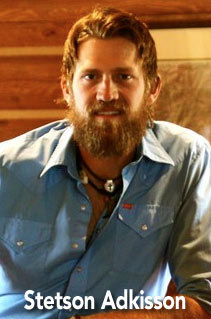 Stetson Adkisson started his musical career in 2003. As a singer, songwriter, and guitarist, he has played many venues in the western United States and released a self-titled album in 2006. The honesty in his voice paired with his real-to-life writing style captivate audiences and have made him a fan favorite. As well as being a touring musician, Stetson is a professional hunting and fly fishing guide. In his time off the road, he can be found fly fishing and hunting often.
Stetson Adkisson started his musical career in 2003. As a singer, songwriter, and guitarist, he has played many venues in the western United States and released a self-titled album in 2006. The honesty in his voice paired with his real-to-life writing style captivate audiences and have made him a fan favorite. As well as being a touring musician, Stetson is a professional hunting and fly fishing guide. In his time off the road, he can be found fly fishing and hunting often.
Stetson teaches songwriting in a fresh, understandable and fun way.
For more information about Stetson, visit: StetsonandCia.com
httpvh://youtu.be/shyoxAMpJM0
Clay Powers – Guitar
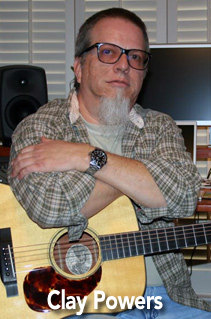 Clay Powers has been playing guitar for 40 years and has played acoustic guitar, electric guitar, pedal steel guitar and bass in a variety of bands in almost every style. His flat-picking guitar style is strongly influenced by musicians including Steve Kaufman, Brad Davis, Tim May, Kenny and Amanda Smith, Jim Hurst and Steve Smith.
Clay Powers has been playing guitar for 40 years and has played acoustic guitar, electric guitar, pedal steel guitar and bass in a variety of bands in almost every style. His flat-picking guitar style is strongly influenced by musicians including Steve Kaufman, Brad Davis, Tim May, Kenny and Amanda Smith, Jim Hurst and Steve Smith.
During this three-day camp, Clay will focus on the fundamentals of flat-picking guitar. He will cover topics including:
-Right hand technique
-Picking exercises
-Improving your tone
-The basic “language” of music / Chords 101
-Practice techniques
-Rhythm playing
-How to incorporate melody into your breaks
-Playing in different positions up the neck
-How to pick out tunes
-Creating your own solos
Currently, Clay and his wife Sheila own and operate Charley’s Guitar Shop in Dallas, Texas. Prior to Charley’s, Clay spent over 20 years with Dallas-based Showco and Vari-Lite. With Showco he designed sound systems for a “Who’s Who” of international touring artists and holds two U.S. patents for digital mixing console designs. Ultimately, Clay became president of Vari-Lite International, a public company with offices in the U.S., Europe and Asia, which grew out of Showco’s innovation of the first computer controlled automated stage lighting system. In 2002, Clay and Sheila decided to rededicate themselves to something they have always enjoyed: playing music and buying, selling and trading great instruments. Charley’s has been dealing in fine and vintage stringed instruments since 1976.
For more information about Clay, visit: CharleysGuitar.com.
Roland White – Mandolin
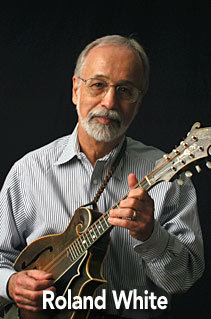 It is a warm spring evening in Nashville. Inside the world famous Station Inn a crowd that was waiting in line even before the club’s doors opened at 7 p.m. is anxiously awaiting an evening with the Nashville Bluegrass Band (NBB). The small listening room is packed with NBB faithful. Returning from Los Angeles, where their latest album, Unleashed, won the Grammy for album of the year only a week earlier, the band’s members are in high spirits, mixing with the members of the crowd, laughing, joking and telling stories. Then, shortly after nine, the band opens its high energy set. Halfway through it, Roland White steps up to the microphone for his first vocal solo, Bill Monroe’s “Toy Heart.” For White, who turns in his usual solid performance, this evening is the latest triumph in a journey that began many years before and many miles away.
It is a warm spring evening in Nashville. Inside the world famous Station Inn a crowd that was waiting in line even before the club’s doors opened at 7 p.m. is anxiously awaiting an evening with the Nashville Bluegrass Band (NBB). The small listening room is packed with NBB faithful. Returning from Los Angeles, where their latest album, Unleashed, won the Grammy for album of the year only a week earlier, the band’s members are in high spirits, mixing with the members of the crowd, laughing, joking and telling stories. Then, shortly after nine, the band opens its high energy set. Halfway through it, Roland White steps up to the microphone for his first vocal solo, Bill Monroe’s “Toy Heart.” For White, who turns in his usual solid performance, this evening is the latest triumph in a journey that began many years before and many miles away.
In fact, he still remembers clearly how it began. Barely eight, Roland, the eldest of the White children was helping his mother in the kitchen as they listened to a country radio station. As one song faded into the next, White asked her one question after another about the singers he heard. As they spoke, he told her that he, too, hoped to sing on the radio one day. Practice, she told her son, and you might be able to earn your living just like the folks on the radio.
The moment was a revelation for young Roland. “When I heard that I thought, ‘Man, that’s what I want to do.’ And, it seemed like the more I thought about it, the more I wanted to do it.” For a boy with these intentions, there may not have been a better place to be than the White household in those days. Growing up in the rural state of Maine with few outside distractions, White was surrounded by his father’s siblings, 16 in all, many of whom were musicians. There were always instruments around and plenty of people to play them. And almost every week, somebody was buying a new 78 rpm record to add to the Whites’ diverse collection.
Often, White’s father and uncles met there to sing and play. At first, White and his sister, Joanne, would join in the singing. But before long, White had a guitar in his hands and was trying to mimic the sounds his dad made on the instrument.
Focused on his dream, White organized “band” rehearsals each night with his own younger brothers, Eric and Clarence. Though the younger White boys were initially more interested in playing outdoors, White, with the backing of his parents, persisted until the practices became a regular part of each day.
White says his father always supported his musical ambitions. “If he was doing something around the house I would hang out with him and ask to help. He’d say, ‘well, I’d rather you be working on your instrument.'”
Though he started on the flattop, it wasn’t long before the future Blue Grass Boy had a $2.50 “tater bug” mandolin in his hands. He still remembers how comfortable it was to play the smaller instrument initially while Eric played tenor banjo and Clarence the guitar, and Joanne sang and sometimes played bass. To start, says White, the three of them would play old time country songs they learned from their father and uncles. “We just played what we knew,” he says.
Throughout the early 1950s, the White children were learning all the songs they could as fast as they were able. About once a month the boys would play in local Grange Halls, and they performed at family gatherings and for household guests. By the time their father moved the family to Burbank, California, for a new job, the children were ready to take their careers to the next level.
Only a month after arriving in California, the White children entered and won a talent contest on a local radio station. Then, the boys auditioned at an area television station for a new show that was looking for “kid” acts. They were hired on the spot as the “Country Boys,” this time without Joanne, who decided not to continue.
California also opened other new worlds for White and his siblings. It was there that he received his first exposure to Big Mon. Playing a $25 F-style Kalamazoo brand instrument by this time, White says one of his uncles told him about a mandolin player on the Grand Ole Opry named Bill Monroe who was “pretty good, pretty quick.” That led him to a local music store where he ordered, at random, a 45 rpm version of Monroe’s “Pike County Breakdown.”
White was a little frustrated upon first hearing Monroe. “I thought, ‘This is neat, but this is really fast.’ We never played it like that back then. But it was interesting to try and break it down, which was almost impossible at first.”
Not long after he received the record, White saw Monroe for the first time on television. “It was Christmas Eve of 1956 on a show called Town Hall Party, I was watching him and I had my mandolin in hand. In fact, that’s how I learned to do mandolin chords. It was a real eye opener to see how was holding his hands,” says White. Around this time the brothers first met banjo player Billy Ray Latham who, with Roland and Clarence, would ultimately form the nucleus of the Kentucky Colonels. “When we met him, we invited him over to the house and that was it, there was our bluegrass band.”
Over the next few years the band played constantly and made regular appearances at a Hollywood folk music club known as the Ash Grove. Then, in 1960, Roger Bush took over the bass duties from Eric and the Colonels lineup was complete. The band was then joined by Leroy McNees on Dobro, while Bobby Slone and Scott Stoneman would sometimes add their fiddling to the mix.
In 1963, after Roland returned from a two-year stint in the Army, the Colonels toured the eastern half of the country, playing clubs and coffeehouses. The next year they returned to the East and made a well-received appearance at the Newport Folk Festival in July, where an extremely-nervous Clarence was invited to a guitar workshop hosted by Doc Watson. “It was probably the biggest crowd we had ever seen,” says White. In that same year the band recorded its critically acclaimed album, Appalachian Swing, recently reissued on Rounder Records. Ironically for an album that has become a centerpiece in many bluegrass instrumentalists’ collections, White says Appalachian Swing was recorded without vocals as a way to cut costs.
As the folk boom died down in the mid-’60s, the Colonels found it harder to get bluegrass gigs. And, by 1966, Clarence, who had begun playing more electric guitar, left to do studio work, which eventually led to his joining the Byrds. Roland, meanwhile, had taken up electric bass and was playing country music in Southern California’s lounges to help make ends meet. In 1967, White made his way back to bluegrass when Bill Monroe was touring California. Lamar Grier, then Monroe’s banjo player, told White the Blue Grass Boys needed a guitar player to replace Doug Green, who was returning to college. “I knew I could do what he needed, so I asked him for the job and he hired me,” says White. The job with Monroe lasted for the better part of two years until White signed on as mandolin player with Lester Flatt’s newly formed Nashville Grass. He stayed with Flatt four years until deciding to reunite with brother Clarence in 1973. Billed the New Kentucky Colonels, the brothers performed on the East and West coasts, made a tour of Europe, then went to California to prepare to record an album. But just as the venture began it was over. In July of 1973, as Roland and Clarence were loading their equipment into the car after a gig, the pair was struck by a car. Clarence was killed and Roland sustained minor injuries. There were many things the pair had intended to do, says White. “Clarence wanted to try lots of different things; some electric, some acoustic,” says White.
After the accident, White returned home to Nashville to regroup when he got a call from Roger Bush and Alan Munde, who had formed the successful Country Gazette.
“They needed a guitar player and asked if I was interested. Well, that was just the thing I needed. I had been really looking forward to working with Clarence again, we had plans and then I had nothing. So, I took the job,” he says.
White fondly remembers the 13 years he spent as the Gazette’s guitar player then mandolinist. “The fun part was working with the people who were in the band…Alan, Roger, Byron Berline, Kenny Wirtz, Joe Carr. They were great. Creativity [in this band] was happening with new arrangements, new songs, new venues.”
Since 1989, White has had his current gig as the mandolin player for the NBB, referred to by some as the “state-of-the-art” bluegrass band. “Though we are bluegrass, I sometimes think of us as an acoustic country band. We’ve played all kinds of songs that didn’t come to us as bluegrass songs at all. If anyone tells me: ‘I’ve got a bluegrass song for you,’ I don’t even want to hear it, because it probably won’t be any good. The bluegrass songs have been written…by Bill Monroe, Lester Flatt and others. Those songs have been done, they’re like the old jazz standards, and they’re great and I still like to listen to them.”
While he still listens to the old Monroe and Flatt and Scruggs albums, White confesses a real love of jazz and says he is just as apt to have the recordings of Herb Ellis, the Modern Jazz Quartet or Freddie Green in his compact disc player. Someday, he hopes to learn it well enough to perform and record it.
Over the years, all of these influences and experiences have helped White to develop a unique style. His playing is simple, uncluttered and relaxed with a clock-like sense of timing. And, White feels that playing has found a real home with the NBB. “I don’t know who else I would want to work with. I played with these guys around town a long time before they formed the band and when they did I thought, ‘This is the coolest thing since Monroe and Flatt and Scruggs played together.'”
White offers nothing but praise for each of his fellow bandmates. On fiddler Stuart Duncan: “Every time we play he will do something that will make me just want to drop my pick. He’s just so remarkable.” On guitarist and vocalist Pat Enright: “He’s a great rhythm guitar player. He’s just wonderful, he never does anything that doesn’t work. It’s straightforward and simple and no one knows how to do it except for Pat. It’s hard to do.”
“Gene Libbea,” says White, “is the kind of bass player that nobody has in bluegrass. He has played all kinds of music. I really like what he does; he’s an eye opener and other people need to listen to what he’s doing. And Alan O’Bryant is a hellacious banjo picker and singer. I don’t know why he doesn’t get any awards for his work, he sings the heck out of anything he does.”
With a lineup that appears secure into the foreseeable future, and the second Grammy award under their belts, Roland and his colleagues hope to continue to spread the bluegrass gospel far and wide. The key to gaining widespread acceptance of the music, says White, is television. Just as television brought him his first glimpse of Monroe, White believes it has the potential to create millions of new fans. “Everybody’s got a tv. If there was one good bluegrass concert on a week, you’d see lots more people buying the music. That’s what happened with country music.”
Country singer Marty Stuart, who has known White since the days when the two played in Lester Flatt’s band, recently wrote this of his friend: “For those of us who love bluegrass music, it’s always been the same. It’s understood that Bill Monroe is the Father of it all…but time has a way of crawling along and taking the responsibility for the future to other souls. As long as I know that Roland has a voice in the inner circle, I know that everything’s going to be all right concerning the tradition and future of bluegrass.”
For more information about Roland, visit: RolandWhite.com
Nate Lee – Mandolin
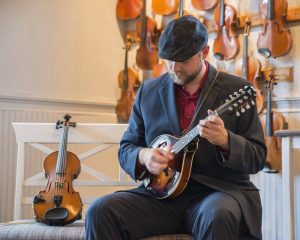 Nate Lee is a 2015 IBMA Momentum Award winning instrumentalist and renowned teacher of private lessons and music camps. While attending the Bluegrass & Country Music Program at South Plains College, Nate joined the Alan Munde Gazette. He toured with the band for six years and played fiddle on their second release, Made To Last. After moving to Nashville in 2012, Nate toured with Irene Kelley, Town Mountain, and the Jim Hurst Trio. Although Nate is in demand on stage and in the studio, his first love is teaching. With more than thirteen years’ experience as a teacher and workshop instructor, Nate has gained a loyal following of students who enjoy his comprehensive teaching methods and relaxed, encouraging demeanor. Nate can be found playing mandolin, twin fiddle, and singing with the Becky Buller Band. He is also a member of the IBMA Leadership Bluegrass committee and a 2014 graduate of the program. For more info on studying music with Nate and to check out his Plays Well With Others solo album and his popular new teaching DVD, How To Play A Break On A Song You’ve Never Heard Before, visit TheNateLee.com and PlayNately.com
Nate Lee is a 2015 IBMA Momentum Award winning instrumentalist and renowned teacher of private lessons and music camps. While attending the Bluegrass & Country Music Program at South Plains College, Nate joined the Alan Munde Gazette. He toured with the band for six years and played fiddle on their second release, Made To Last. After moving to Nashville in 2012, Nate toured with Irene Kelley, Town Mountain, and the Jim Hurst Trio. Although Nate is in demand on stage and in the studio, his first love is teaching. With more than thirteen years’ experience as a teacher and workshop instructor, Nate has gained a loyal following of students who enjoy his comprehensive teaching methods and relaxed, encouraging demeanor. Nate can be found playing mandolin, twin fiddle, and singing with the Becky Buller Band. He is also a member of the IBMA Leadership Bluegrass committee and a 2014 graduate of the program. For more info on studying music with Nate and to check out his Plays Well With Others solo album and his popular new teaching DVD, How To Play A Break On A Song You’ve Never Heard Before, visit TheNateLee.com and PlayNately.com
Alan Tompkins – Bass
BLUEGRASS TODAY calls Alan Tompkins “a true Renaissance man,” and the title certainly fits. A native of the farming and coal mining country of western Kentucky, Alan grew up steeped in the sounds of classic country, gospel, and bluegrass music. He performed in several bands in his home town of Madisonville, Kentucky before moving to Texas in 1983, where he earned MBA and law degrees at SMU.
It was a thrill for Alan to produce and record his first album, No Part of Nothin’ , released in 2012. The album features a lineup of incredibly talented musicians and singers, many of whom are Grammy® or IBMA award winners or nominees. The list includes Sam Bush, Deryl Dodd, Kenny & Amanda Smith, Ron Stewart, Stephen Mougin, Gerald Jones, Greg Cahill, Ned Luberecki, Mike Bub, Randy Kohrs, Brad Davis, Nate Lee, Bobby Davis, and Steve Rhian.
Alan is the founder and President of the Bluegrass Heritage Foundation, a non-profit organization dedicated to the promotion of bluegrass music in America. The Foundation produced Fanning the Fire, an award-winning short film about bluegrass music that screened in more than 25 film festivals across the United States, in 2011. He’s a 2009 graduate of the IBMA Leadership Bluegrass program and presently serves as the chair of the planning committee for the program. Alan plays a Huber Banjo, some great, really old Gibson banjos, a 1961 Kay bass, a New Standard Cleveland bass, Beard dobros, and few other great instruments.
For more information about Alan, visit: AlanTompkins.com
Jim Chancellor – Fiddle
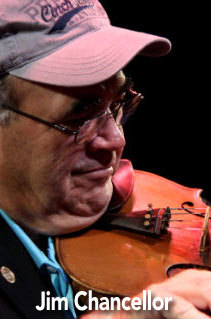 Jim “Texas Shorty” Chancellor began his musical journey at the age of seven when his daddy brought home a mandolin and told Shorty and his brother, Allen, that it would go to the first son who learned to play it. Shorty devoted most of the next six years to “pickin’ the mandolin.” Around 1956 a landmark occurred in Shorty’s musical development when he became acquainted with the legendary Bennie Thomasson, who was the then-current World Champion Fiddler. Bennie’s unique style of fiddling immediately attracted Shorty and he soon gave up the mandolin and poured all his efforts into old-time fiddling .
Jim “Texas Shorty” Chancellor began his musical journey at the age of seven when his daddy brought home a mandolin and told Shorty and his brother, Allen, that it would go to the first son who learned to play it. Shorty devoted most of the next six years to “pickin’ the mandolin.” Around 1956 a landmark occurred in Shorty’s musical development when he became acquainted with the legendary Bennie Thomasson, who was the then-current World Champion Fiddler. Bennie’s unique style of fiddling immediately attracted Shorty and he soon gave up the mandolin and poured all his efforts into old-time fiddling .
Three years later in 1959, under the tutorage of Bennie, Shorty won the World’s Fiddle Festival. In 1960 he went to New York to appear on a national television quiz show “To Tell The Truth” as the youngest fiddler to hold the World’s Championship. He became the second fiddler in the history of the World’s Fiddle Festival to attain undefeated status by winning the contest three consecutive times.
Succeeding years have seen Shorty win hundreds of fiddle contests throughout the nation, among them the National Fiddle Championship and the Texas State Championship on several different occasions. In the early 1960’s, through the efforts of an avid fan, a record company was established to produce Shorty’s music. The circulation of the fiddle records over the years has taken his music to every part of the nation. Old time fiddle music has been the first love of Shorty’s life for many years and he has encouraged young fiddlers to take up the art. Public awareness of this great music has grown to the extent that a music, which was once threatened with extinction, has been revived and is once again solidly entrenched in the entertainment world. In 2010, Shorty was a recipient of the very prestigious National Endowment for the Arts National Heritage Fellowship.
For more information about Jim visit: https://TexasShorty.com.
Amanda Smith – Jam Facilitator
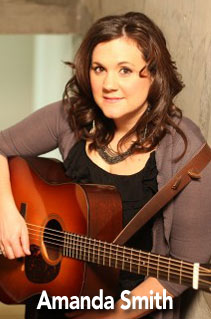 Born in the small town of Davisville, WV, Amanda Smith grew up singing in church choirs and participating in talent contests at local fairs. “I always sang, my mom and dad said, even before I can remember, “she says today. She started playing guitar in high school to accompany herself, and soon discovered bluegrass music through female artists such as Claire Lynch, Rhonda Vincent and Alison Krauss. She met her future husband at a Lonesome River Band concert, and the couple began dating and playing music together almost immediately. “I wouldn’t say it was love at first sight, but there was definitely something there,” she explains. Their shared Christian faith, love for bluegrass and desire to perform together led them to record a debut CD.
Born in the small town of Davisville, WV, Amanda Smith grew up singing in church choirs and participating in talent contests at local fairs. “I always sang, my mom and dad said, even before I can remember, “she says today. She started playing guitar in high school to accompany herself, and soon discovered bluegrass music through female artists such as Claire Lynch, Rhonda Vincent and Alison Krauss. She met her future husband at a Lonesome River Band concert, and the couple began dating and playing music together almost immediately. “I wouldn’t say it was love at first sight, but there was definitely something there,” she explains. Their shared Christian faith, love for bluegrass and desire to perform together led them to record a debut CD.
For more information about Amanda, visit: http//Kenny-AmandaSmith.com
